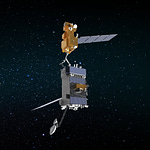What’s in this episode
This is the time of year when we hope legislators and their staffs take time to stand back from the nitty-gritty details of the federal budget to consider how best to deploy public monies to achieve the big and ambitious strategic goals.
This episode is about what the United States should do to ensure it maintains its leadership position in space and its technological edge. According to Todd Harrison, who is this week’s guest, this advantage will be “fleeting without sustained effort and attention” placed on removing the obstacles to accelerating technological invention and innovation.
Todd maintains that the United States already has a proven foundation for success - free markets, an open society, and access to capital - but that more needs to be done to match and surpass the speed at which competitors, like China, are innovating.
Thank you to our generous sponsor, TE Connectivity!

Who’s in this episode
Todd Harrison, Senior Fellow at the American Enterprise Institute, who is a longtime defense budget and space security expert. Here’s Todd’s latest report, “Building an Enduring Advantage in the Third Space Age”.
Some interesting reading
Speaking of innovation and obstacles, in his piece “SpaceX targeting June 5 for 4th test flight of Starship megarocket”, Mike Wall of Space.com wrote, “That date is written in pencil rather than pen, however, for SpaceX still needs to secure regulatory approval — specifically, the U.S. Federal Aviation Administration's acceptance of a Starship launch license modification.”
Eric Berger of Ars Technica is reporting in his “Rocket Report” that Firefly has put up a “for sale” sign. Firefly is space launch company that signed a 10-year contract worth up to $700m in January with the National Reconnaissance Office (NRO). The United Launch Alliance is also searching for a buyer.
While the State of Georgia enacted a law that kills Spaceport Camden, Andrew Jones of SpaceNews wrote that China plans on expanding the Hainan Commercial Launch Site on Hainan Island in his article “China to expand commercial spaceport to support upcoming launch surge.”
And lastly it looks like the National Governors Association, the National Guard Association, and others may have put the brakes on a plan to move Air National Guard space units into the Space Force. Courtney Mabeus-Brown and Zamone Perez of the Air Force Times wrote in their piece , “House proposal could derail Air Force plan to move space Guard units”, that the House Armed Services Committee added an amendment to the defense budget bill that would force the Secretary of the Air Force to contend with a number of difficult hurdles.
Have a great weekend!
Ad Astra!
Laura













